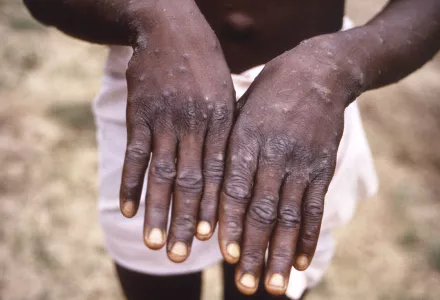
Monkeypox is a viral disease that is transmitted person to person through direct contact with the infectious rash, scabs or bodily fluids including respiratory secretions. Research is ongoing on the potential for sexual transmission through semen or vaginal fluids. Indirect transmission can occur through touching contaminated objects, like towels, bedsheets or sex toys. Most people with monkeypox recover on their own without requiring treatment, beyond supportive care or hospitalization. Due the similarity between monkeypox and smallpox, and because this virus has been found in humans for decades, FDA approved monkeypox tests, treatments (TPOXX), and vaccines exist, but their use has so far been very limited.
As cases of monkeypox continue to increase in the United States and worldwide, household transmission of monkeypox will be a major risk factor for monkeypox transmission. A pooled estimate from a systematic review suggested a secondary attack rate of monkeypox to be nearly 8% (range 0–11%) among household contacts who were unvaccinated against smallpox. A 2013 outbreak of monkeypox in the Democratic Republic of the Congo showed a household attack rate of 50%, that is, half of persons living with an infected person developed monkeypox infection.
To help prevent secondary transmission of the monkeypox virus among household members including pets when living or caring for a person infected with monkeypox, here are some practical strategies households can take to minimize the risk of spread: Stay Distant, Stay Clean, Stay Cautious.
Stay Distant
- If needed, dedicate one member of the household who is not at high risk for severe disease with monkeypox (includes women who are pregnant, children, persons with a history of atopic dermatitis or eczema and people who are immunosuppressed) to care for the housemate who has monkeypox.
- Dedicate a room or space for infected housemate to occupy during entire duration of active rashes and other symptoms (up to 2-4 weeks). Open windows for ventilation.
- Both caregiver and housemate with monkeypox should wear a N95 or KN95 mask that covers mouth and nose when interacting. Caregiver should also wear gloves and eye protection during interactions and avoid skin to skin contact with person with monkeypox (i.e., do not touch rash or scab with person with monkeypox). Housemate with monkeypox should cover any skin lesions during interactions (i.e., wear full sleeves and pants).
- Housemate with monkeypox should avoid contact with any household pets.
- Housemate with monkeypox should avoid sex, kissing, hugging or being intimate with anyone until you have been checked by your healthcare provider or until rash has fully resolved, the scabs have fallen off, and a fresh layer of intact skin has formed. The CDC has published a guide to safer sex and monkeypox.
- If housemate with monkeypox needs to leave the isolation area for any reason, they should wear a N95 or KN95 mask and cover any skin lesions with long pants and long sleeves.
Stay Clean
- Caregiver should practice hand hygiene frequently: prior to eating, after touching common surfaces, and after every interaction with housemate with monkeypox.
- Do not share eating utensils or cups of housemate with monkeypox. Thoroughly wash used dishes and utensils with warm water and soap.
- Soiled laundry of housemate with monkeypox should be kept separate from other members of the household and contained in a laundry bag and never shaken to avoid dispersal of infectious material.
- Housemate with monkeypox should laundry their own soiled items, if possible, using regular detergent and warm water. If caregiver is assisting, wear gloves, gown, N95 or KN95 mask and eye protection when handling or touching bedding, towels, linen, clothing or other soiled laundry of person with monkeypox. Perform hand hygiene when done.
- Routinely clean and disinfect high-touch surfaces like doorknobs, light switches, electronics shared bathroom or other spaces using an EPA-registered disinfectant, and wear, gloves, N95 or KN95 mask and eye protection when cleaning areas where housemate with monkeypox spent time. Do not dry dust or sweep as this may spread infectious particle. Perform hand hygiene when done.
- Clean and disinfect any appliances, shared spaces or items immediately following use of housemate with monkeypox. Wear N95 or KN95 mask eye protection, gloves and gown when cleaning. Perform hand hygiene when done.
- Use a dedicated, lined trash container with plastic bag that is sealable/tie where all contaminated waste generated from housemate with monkeypox (includes paper towels, bandages, gloves that have been in contact with skin) can be placed then thrown away in regular garbage. Wear gloves when removing garbage bags and handling disposing of trash.
Stay Cautious
- If you are household member or close personal contact with person who has monkeypox, speak to your healthcare provider to see if you qualify for pre-exposure or post-exposure vaccination or treatment with TPOXX (Tecovirimat).
- All individuals in the home living with housemate with monkeypox should self-monitor for any signs or symptoms of monkeypox infection and get tested immediately if you become symptomatic.
- Look for warning signs of worsening condition in housemate with monkeypox, and seek medical attention immediately if you observe the following:
- Trouble breathing or swallowing.
- New or worsening chest pain.
- Stiff neck.
- Confusion or trouble thinking.
- Difficulty speaking or moving.
- Loss of consciousness.
- Seizures.
Madad, Syra and Joseph Osmundson. “Prevent The Spread of Monkeypox Within Your Home.” Belfer Center for Science and International Affairs, Harvard Kennedy School, July 12, 2022


